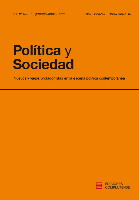
POLITICAL PSYCHOLOGY
Scope & Guideline
Advancing Insights at the Intersection of Psychology and Governance
Introduction
Aims and Scopes
- Political Attitudes and Behavior:
Research in this area examines how individual attitudes towards politics, including voting behavior and civic engagement, are shaped by psychological processes such as emotions, identity, and cognitive biases. - Intergroup Relations and Identity:
This scope focuses on how group identities (e.g., national, ethnic, or political) influence perceptions of in-groups and out-groups, as well as intergroup dynamics, prejudice, and discrimination. - Impact of Ideology on Psychology:
Studies explore how different political ideologies (e.g., conservatism, liberalism, populism) affect psychological outcomes, including moral judgments, social attitudes, and collective action. - Social Justice and Political Activism:
The journal examines the psychological underpinnings of social justice movements and political activism, analyzing how individuals and groups mobilize for change in various sociopolitical contexts. - Role of Media and Communication in Politics:
Research in this area investigates how media representations, narratives, and political discourse shape public opinion and influence political behavior.
Trending and Emerging
- Populism and Political Polarization:
Recent studies have intensified focus on the psychological underpinnings of populist attitudes and the dynamics of political polarization, reflecting the growing global relevance of these issues. - Impact of COVID-19 on Political Behavior:
The pandemic has spurred research into how crises influence political attitudes, collective action, and social cohesion, marking a significant trend in recent publications. - Identity Politics and Intersectionality:
There is a rising interest in how various identities intersect and influence political perceptions and behaviors, highlighting the complexity of modern identity politics. - Social Media and Political Discourse:
Emerging research emphasizes the role of social media in shaping political opinions and behaviors, particularly regarding misinformation, polarization, and civic engagement. - Psychological Resilience in Political Contexts:
Studies are increasingly exploring themes of resilience among marginalized groups and how psychological factors contribute to coping strategies in politically charged environments.
Declining or Waning
- Traditional Political Institutions:
Research focused on traditional political institutions and their psychological impacts has seen a decrease, likely due to increasing interest in grassroots movements and non-traditional forms of political engagement. - Historical Political Events and Their Psychological Impact:
There is a waning focus on the psychological analysis of historical political events, possibly overshadowed by more immediate and contemporary issues such as populism and identity politics. - Psychological Theories of Governance:
The application of psychological theories specifically to governance structures has become less frequent, as research shifts towards more direct implications of psychology in social movements and collective action.
Similar Journals

BRITISH JOURNAL OF SOCIAL PSYCHOLOGY
Advancing the Frontiers of Social UnderstandingBritish Journal of Social Psychology, published by Wiley, stands as a premier outlet in the field of social psychology, boasting an impressive impact factor that cements its position in the top quartile (Q1) of academic journals in the discipline. With a rich history dating back to its inception in 1981 and continuing through to 2024, this journal plays a critical role in advancing the understanding of social behavior and cognition. Ranked #20 out of 310 within the category of Social Psychology by Scopus, the journal sits in the 93rd percentile, reflecting its high-quality contributions to the field. Although it does not currently offer open access options, the British Journal of Social Psychology provides a platform for rigorous empirical research, theoretical discussions, and reviews that are essential for both established scholars and emerging researchers. Its commitment to disseminating groundbreaking social psychological research makes it an invaluable resource for professionals and students aiming to stay at the forefront of the discipline.

Journal of Information Technology & Politics
Advancing Insights at the Intersection of IT and PoliticsJournal of Information Technology & Politics, published by ROUTLEDGE JOURNALS, TAYLOR & FRANCIS LTD, is a leading interdisciplinary journal dedicated to exploring the dynamic interplay between information technology and political processes. Established in 2008, this esteemed journal has garnered a reputation for its rigorous scholarship, achieving prestigious Q1 rankings in the fields of Computer Science, Public Administration, and Sociology and Political Science as of 2023. With its commitment to fostering critical dialogue and advancing research in these rapidly evolving areas, the journal serves as an essential resource for researchers, professionals, and students alike. Although it does not follow an open-access model, its impactful contributions are easily accessible through institutional subscriptions. The journal’s thoughtful examination of IT's role in politics is vital for understanding contemporary governance challenges and the implications of digital technologies on public policy and political behavior, making it indispensable for anyone engaged in this interdisciplinary domain.

Politica y Sociedad
Bridging Disciplines: Where Politics Meets Society.Politica y Sociedad is a leading academic journal based in Spain, published by UNIV COMPLUTENSE MADRID, SERVICIO PUBLICACIONES. With an ISSN of 1130-8001 and an E-ISSN of 1988-3129, this journal has established itself as a critical platform for scholarly discourse in the fields of Sociology and Political Science. Since its inception in 1988, Politica y Sociedad has embraced the Open Access model, promoting broad dissemination of research findings and ensuring accessibility for all. The journal has been recognized for its significant contribution to the academic community, achieving a respectable Q2 ranking in both Sociology and Political Science categories and ranking #908 out of 1466 in Scopus. With its commitment to publishing high-quality research, the journal serves as an essential resource for researchers, professionals, and students interested in the intricate dynamics of politics and society.

PSYCHOLOGICAL INQUIRY
Connecting Theory and Practice in PsychologyPSYCHOLOGICAL INQUIRY, published by Routledge Journals, Taylor & Francis Ltd, is a leading peer-reviewed journal dedicated to advancing the field of psychology. With an ISSN of 1047-840X and an E-ISSN of 1532-7965, this journal has established itself as a reputable source of innovative research and theoretical discussions since its inception in 1990. The journal has consistently maintained a prestigious Q1 ranking in the miscellaneous psychology category, reflecting its critical role in shaping contemporary psychological discourse. The journal covers a vast range of topics within psychology, making it a vital resource for researchers, professionals, and students seeking to explore emerging trends and findings. Although not open access, it ensures wide dissemination of significant research outputs through its rigorous editorial standards and high-quality publications. With a remarkable Scopus rank of #14 out of 216 in General Psychology, PSYCHOLOGICAL INQUIRY continues to influence practice, policy, and further research in the field.

AMERICAN JOURNAL OF POLITICAL SCIENCE
Elevating Empirical Research in Political ScienceAmerican Journal of Political Science, published by Wiley, stands as a premier academic outlet in the field of political science and sociology, encapsulating the dynamic interplay of theory and empirical research. With an impressive impact factor and ranked in the top quartile (Q1) of both Political Science and International Relations as well as Sociology and Political Science categories, this journal not only provides a platform for groundbreaking research but also influences the scholarly discourse across these disciplines. The journal boasts a rigorous peer-review process, ensuring the publication of high-quality and impactful articles that contribute significantly to the advancement of knowledge in the social sciences. Although primarily subscription-based, researchers and academics are encouraged to engage with the journal, which has consistently evolved to accommodate the changing landscapes of global politics and society. With a publication history that spans multiple decades, the American Journal of Political Science remains essential for scholars, practitioners, and students committed to understanding the complexities of political mechanisms and social dynamics.

Politics Groups and Identities
Illuminating the Dynamics of Group Behavior in PoliticsPolitics Groups and Identities is an esteemed academic journal published by Routledge Journals, Taylor & Francis Ltd, focusing on the interdisciplinary study of political group dynamics, identity formation, and social movements. As a vital resource for researchers, professionals, and students alike, this journal encourages robust discourse around contemporary political issues and seeks to bridge gaps between theory and practice. While the journal currently does not feature an open-access model, it maintains a reputation for rigorous peer-reviewed scholarship, thus ensuring high-quality contributions that shape our understanding of global political identities. Located in the heart of England, the journal is committed to disseminating cutting-edge research that examines the intersections of politics, social identity, and group behavior, making it indispensable for anyone interested in the complexities of political engagement in a rapidly changing world.

POLITICAL BEHAVIOR
Illuminating the intricacies of voter behavior.POLITICAL BEHAVIOR is a prestigious, peer-reviewed journal published by Springer/Plenum Publishers, dedicated to advancing the understanding of political behavior. Since its inception in 1979, this journal has become a leading platform for scholarly discourse, boasting a remarkable Q1 ranking in both Sociology and Political Science and solidifying its reputation as a vital resource in these fields. With an impressive Scopus rank of 51 out of 1466 and a 96th percentile ranking in Social Sciences, POLITICAL BEHAVIOR provides high-quality research and insights that illuminate the complexities of voter behavior, political participation, and the underlying social factors influencing political decision-making. Although it does not currently offer Open Access options, the journal is crucial for researchers, professionals, and students seeking to engage with cutting-edge research and thought leadership in the realm of political science. Based in the United States, at 233 Spring St, New York, NY 10013, POLITICAL BEHAVIOR plays an essential role in shaping discussions and disseminating knowledge to a global audience.

Social Psychology
Bridging disciplines to enhance social understanding.Social Psychology is a premier journal published by HOGREFE PUBLISHING CORP, dedicated to advancing the field of social psychology through rigorous research and innovative theory. With a strong foundation established since its inception, the journal boasts an impressive impact, having achieved Q1 status in Arts and Humanities and Sociology and Political Science as of 2023, reflecting its importance in interdisciplinary research. Based in Germany, and accessible via both print (ISSN: 1864-9335) and electronic formats (E-ISSN: 2151-2590), it serves as a vital resource for academics and practitioners seeking to understand the dynamics of social behavior. The journal offers open access options, ensuring that findings are widely disseminated and accessible to a global audience. With a focused scope covering key issues in social influences, group dynamics, and interpersonal relationships, Social Psychology is an essential platform for those committed to enhancing our comprehension of the social dimensions of human life.

International Review of Social Psychology
Elevating Research in the Realm of Social PsychologyInternational Review of Social Psychology is an esteemed academic journal published by UBIQUITY PRESS LTD that has been making significant strides in the field of social psychology since its inception in 2016. With an impressive impact factor reflecting its high-quality research output, this Open Access journal offers unrestricted access to scholarly articles, encouraging global discourse and collaboration. Based in the United Kingdom, the journal occupies a prestigious position, ranking #76 out of 310 in the Scopus category of Social Psychology, placing it within the top 75th percentile of its field. The Q1 quartile classification for 2023 underscores its significant contribution and influence in advancing the science of social behavior and thought. Covering a broad array of topics, from group dynamics to social influence, the journal aims to stimulate critical dialogue among researchers, practitioners, and students alike, promoting a deeper understanding of the complexities of social interactions. With its commitment to open and impactful research, the International Review of Social Psychology is an essential resource for anyone interested in the ever-evolving landscape of social psychology.

Austrian Journal of Political Science
Empowering Voices in Political ScholarshipThe Austrian Journal of Political Science, published by the OSTERREICHISCHE GESELLSCHAFT POLITIKWISSENSCHAFT, is a pivotal scholarly resource in the field of political science and sociology. With an E-ISSN of 2313-5433, this open access journal has been promoting academic discourse since 2014, ensuring that research findings are accessible to a global audience. Based in Vienna, Austria, this journal plays a crucial role in shaping political studies by publishing innovative and impactful research that spans various aspects of political analysis, public policy, and social dynamics. Its significant standing is reflected in its Q3 category ranking in the 2023 Scopus database, where it holds a rank of 776 out of 1466 in the Social Sciences, demonstrating its relevance and contribution to contemporary scholarship. Researchers, professionals, and students are encouraged to engage with this valuable journal to stay informed on the latest advancements in political science.